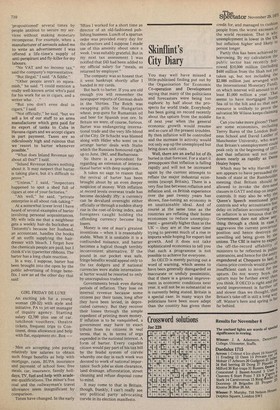Skinflint's City Diary
You may well have missed a little-publicised finding put out by the Organisation for Economic Co-operation and Development saying that many of the politicians and forecasters were being too euphoric by half about the prospects for world trade. Everybody has been going on record recently about the upturn from the middle of next year when the general economic growth would resume and so cure all the present troubles. By then inflation will be controlled and the increase in activity would not only sop up the unemployed but bring down unit costs.
Well, there are an awful lot of ifs. buried in that forecast. For a start it presupposes that inflation is falling rapidly and will not be increased again by the current attempts to reflate the major industrial economies (except Britain). There is a very fine line between reflation and inflation and, as British experience over the pas: twenty years has shown, fine-tuning an economy is an unattainable ideal. And of course at the same time as the countries are reflating their home economies to reduce unemployment — generally higher than in the UK — they are at the same time trying to prevent much of a rise in imports while hoping for export-led growth. And it does not take sophisticated economics to tell you that such a programme is not possible to achieve for everyone.
So OECD is merely putting out a word of warning, which seems to have been generally disregarded as inaccurate or unduly pessimistic, that if there is a general improvement in economic conditions next year, it will not be as substantial as is currently being stated. Britain is a special case. In many ways the politicians have been more adept than the country has given them
credit for, and managed to cushion people from the worst excesses at the world recession. That is 1,1/bY unemployment is lower in the InC but inflation higher and likely to persist longer. Partly this has been achieved by borrowing. By my calculation the public sector has recently borrowed $10,000 million (including $400 million from the Shah not Yet taken up, but not including the $2,000 million just arranged with the International Monetary Fund), on which interest will amount to at least $1,000 million a year. That seems to have mortgaged North Sea oil to the hilt and so that new resource is unlikely to prove the salvation Mr Wilson keeps claiming for it. Can you take more gloom? There are some economists, including Terrry Burns of the London Business School and David Laidler at" Manchester University, who war° that Britain's unemployment could peak only in the beginning of 1977. and that inflation will not CO
down nearly as rapidly as Healey Denis.
Which may be why Harold Wilson appears to have persuaded the heads of state at the Rambouillet meeting that Britain should be allowed to invoke the dire-necel clauses in GATT and slap on imP°11. controls. It may also be why the Queen's Speech mentioned Price' controls and why accountants fen! delay on inflation accounting: grIP on inflation is so tenuous that the Government dare not allow thing through a chink in case aggravates the current precari0n5 position and hence destroys t,..11: unwilling aid being given by til; unions. The CBI is naive to exnel the off-the-record affability ministers to be reflected in public utterances, and hence for the arnItit engendered at Chequers to last:' claims price controls would provide insufficient cash to invest for the upturn. Do not worry boys the upturn may be further away tharl you think. If OECD is right and ttifs world improvement is further ni' and slower than we thought, the Britain's take-off is still a long wa., off. Winter's here and spring is
far behind.


































 Previous page
Previous page